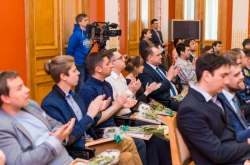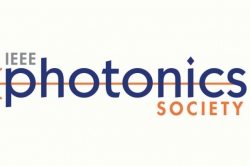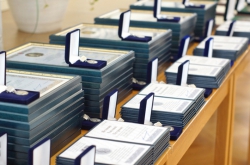Andrey Nikolaev, a lecturer at the Faculty of Technological Management and Innovations
I applied for participation with my study guide ‘Technology of Innovations’, which is intended for non-specialist audiences. In it, I explain the notions of innovations and innovation processes, as well as the methods of innovation enterprise management, in a way that is at the same time comprehensive and accessible. I also include scenarios for business games and self-study tasks. My goal was to create an almost-universal guide for introducing students to the subject, and I’m happy with the results I achieved.
I’m a PhD student myself, and need to interact with my colleagues in other cities and delve into how business processes are organized at different enterprises as part of my thesis research. I plan on using the prize to support my internship at a pharmaceutical company.

Scientists have to be incentivized, or else it would be hard for us to get out of the crises that inevitably happen in any kind of project work. Funding is one such incentive, but it’s not the only one. What also matters is the support you feel from your colleagues and your university, and the right environment where each person’s accomplishments are seen as equally important. From my own experience of organizing international research projects, for example, the i-Customs Conference, which was hosted under the umbrella of the St. Petersburg International Economic Forum, I can attest to the fact that seeing your work being recognized as useful for the society at large is a very good source of motivation to develop further and keep reaching new heights.
Galina Demidova, a lecturer at the Faculty of Control Systems and Robotics
As a member of the R&D center ‘Precision Electromechanics’, which focuses on the production of high-precision technical systems, I used my experience to develop the study guide ‘Fuzzy-logic controllers in technical object management systems’.
Young Russian scientists of today enjoy an extensive grant support system. If you have a good project, there’s always a chance for a grant, especially if you have a background in research, so it’s better to start your scientific activities when you’re still a Bachelor’s student and then work your way up while developing your skills. That way, by the end of your Master’s, you’ll already have a good record of publications in major international periodicals and presentations at prominent scientific conferences, which is highly appreciated by experts and committees which decide on who gets the grant.

ITMO University has done and does a lot to motivate young scientists both in the field of science and education: there’s a great system in place for updating students and staff on the contests that are going on, and you’re offered help in sorting out the paperwork you need for a grant application. Our Faculty of Control Systems and Robotics has its own grant support system available for promising projects of our Master’s and PhD students, and hosts annual international summer schools, encouraging PhD students to participate as assistant teachers. There are no obstacles if you’re truly determined on achieving something in this sphere. You just need to stop lazing around and work, work, work. In the words of the Nobel Prize winner Pyotr Kapitsa, ‘Science should be fun, engaging and easy. And so should be scientists!’
Now I’m really looking forward to the winter holidays: I wouldn’t mind a bit of a break. I want to spend my prize on a ski vacation because active rest always brings me new ideas to fulfill in the new year.
Daria Denisova, a lecturer at the Institute of International Development and Partnership
I competed with a syllabus for the course ‘Modern Science and Scientific Forecasting’. For our Master’s program in Scientific Communication, this is a seminal course that has been one of the first to appear in the curriculum. It’s important for a science communicator to understand how the academic world works, but it’s even more important to stay in touch with scientists who focus on topical issues. Some of these scientists have contributed to the course as guest lecturers: Vasily Klucharev, Artem Oganov, Alexander Ivanchik, Egor Zadereev, Mikhail Gelfand, and others.

The course allows students to grasp the structure of academic science and the specifics of scientific research at universities, and also develop the toolkit needed for studying scientists and their accomplishments. A special part of the course is a final project: students have to come up with a portrait of a scientist, create a sort of an encyclopedic entry for them, and then propose and, if possible, implement a media project based on the information they’ve gathered. There were a couple of especially memorable projects last year: an interview with the archaeologist Leo Klejn (our friends from Bumaga newspaper were amazing in supporting this student initiative), an animation about Sergey Popov, and a gamified test on the research of Vasily Klucharev.
We regularly participate in contests and grant competitions, and recommend our students to create a healthy habit out of monitoring the opportunities on offer, of which there are much more than meets the eye. It’s great that the Government of St. Petersburg supports such initiatives. For example, a graduate of our Science Communication Master’s has recently won in a student competition of solutions for creating a tolerant environment in St. Petersburg, which was held by the Committee on Science and Higher Education. Our students also took first prizes at the student project contest PROBA, Presidential grants competition, scholarship contest of the Vladimir Potanin Foundation, and that’s just some of their victories. I’m especially proud of the fact that some of the students are also trying their hand at teaching, at ITMO University in particular.
Olga Kuznetsova, a lecturer at the Faculty of Information Security and Computer Technologies
I participated with the study guide ‘Foundations of Electronic Devices Design: a Practical Course’, which is being actively used in the training of Bachelor’s students of the program ‘Design and Technology of Electronic Devices’. By carrying out practice-oriented tasks supplied in the guide, students develop invaluable skills for performing engineering calculations that are integral when designing electronic devices.

There are a lot of research topics that are supported both on regional and federal levels in Russia, so much so that young scientists are in no way limited in what projects to pursue. With the extensive levels of support that ITMO offers to its students and staff, we have all we need to progress in our work.
Anna Spiridonova, a senior lecturer at the Faculty of Software Engineering and Computer Systems
My competition entry was a syllabus I developed for the course ‘History of World Art’, which has been partially taught in English for two years now. The course is aimed at the students of the Educational Center of Graphic Technologies, who will go on to become full-blown designers, and so has to prepare them for the situations of intercultural communication they’ll find themselves in when working on international projects.
I don’t see any problems in the field of humanities research, except for financial ones: a lack of appropriate funding does limit our freedom as researchers. That said, I know for a fact that scientists who work on their ideas and strive to implement them successfully end up accomplishing their goals and getting good pay, to boot. I think that in general, our country offers favorable conditions for science and young scientists, so your success to a large extent depends on how proactive you are in searching opportunities for collaborations, as well as grants and contests available out there.
Asel Romanova, a lecturer at the Faculty of Software Engineering and Computer Systems

As part of my application for the Government of St. Petersburg’s prize, I presented a syllabus for the course ‘CMS Systems in Web Design’, which is an introduction to content management systems such as Wordpress, Joomla, and Drupal. It also covers techniques for the optimization and promotion of websites, including those on mobile devices. We currently plan to expand the course with a series of video lessons.
I want to use the prize money I won to participate in various IT forums, purchase textbooks, enrol in a couple of online courses, and go to a Metallica concert. There will be a prominent mobile development conference, Mobius 2018, taking place in Moscow on December 8-9, so maybe I’ll give it a go.
As I see it, there are three ways for helping young scientists develop: you could raise their salary, compensate for their participation in fee-based conferences, or send them on internships. What young scientists have to do in return is devote themselves to science and teaching.




